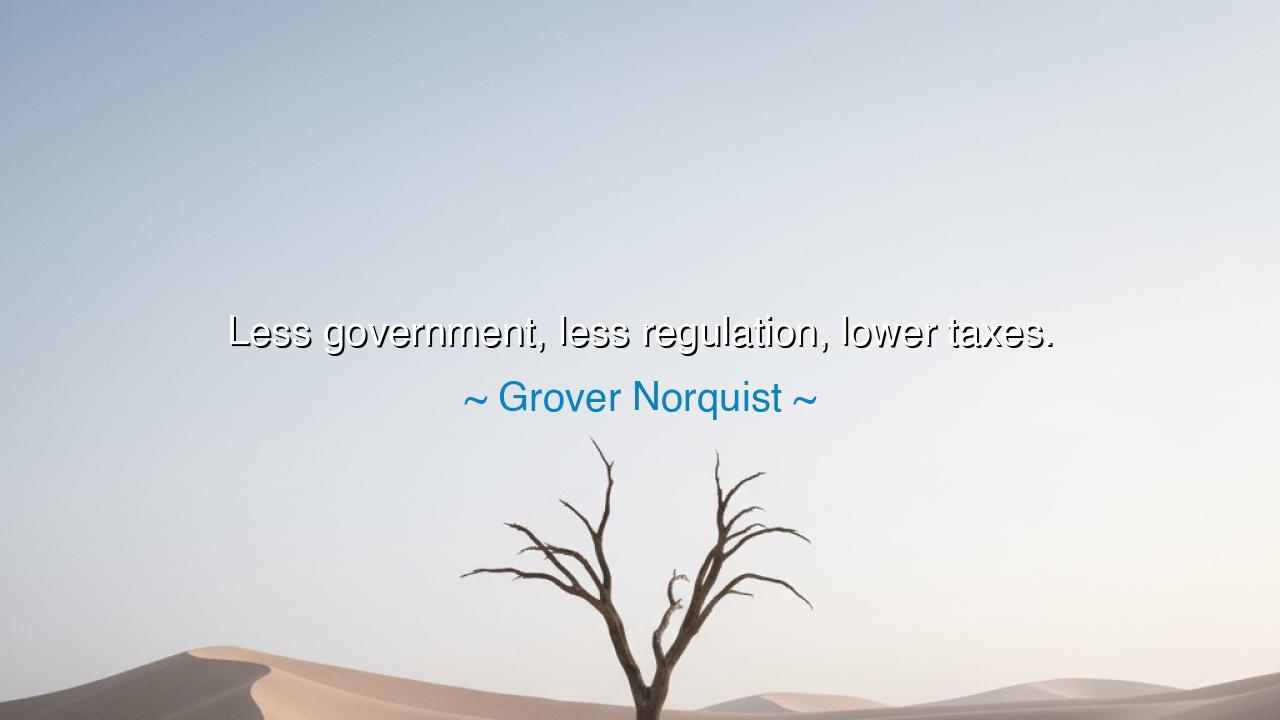
Less government, less regulation, lower taxes.






In the elder days of the Republic, and in the echoing chambers of men who still remembered the price of freedom, the words “Less government, less regulation, lower taxes” rose not as mere policy, but as a creed—a declaration of faith in the spirit of man. These words, uttered by Grover Norquist, are not the child of convenience nor the whisper of politics. They are the song of those who remember that the human soul is meant to be sovereign, not shackled; that the flame of liberty burns brightest when the wind of interference is stilled.
From the dawn of civilization, rulers have been tempted to stretch their hands over the affairs of their people. Empires have crumbled not always from enemies abroad, but from the slow, choking weight of bureaucracy and taxation within. Rome, mighty and adorned, began as a republic of free men, till laws multiplied like ivy and the state fed upon the sweat of its citizens. What began as governance for protection became government for control. Thus, the cry for less government is not a plea for chaos—it is a remembrance of balance. It is the ancient call: “Rule only as much as is necessary, and no more.”
Regulation, too, though born of good intention, often grows into a vine that strangles the fruit it seeks to guard. When man’s hand is bound by endless rule, his will weakens, his vision dims. Consider the blacksmith who cannot forge without a license, the merchant who must seek permission to trade, the farmer who cannot sow where his father sowed. When rules replace trust, innovation dies. The heart of freedom is not lawlessness—it is the sacred trust that men may govern themselves with virtue and reason, needing not the constant shepherding of the state.
Lower taxes, then, is not merely a call for wealth; it is a cry for ownership—that a man’s labor belongs first to him, and not to the state. It is a declaration that the sweat of the brow and the harvest of toil are holy things. When the fruits of labor are taken in excess, the bond between effort and reward is broken. History bears witness: in the 1980s, under President Ronald Reagan, a reduction in taxes did not bring ruin, but revival. The nation, unburdened, breathed again—industry rose, innovation flourished, and hope rekindled in the hearts of millions. That moment, too, was the echo of Norquist’s creed.
Yet the path of liberty is not without peril. For freedom demands responsibility—that men use their independence with wisdom, not waste. Less government means more duty upon the individual: to act justly, to build, to care for neighbor and nation alike without the command of law. As the ancients taught, “He who would be free must first govern himself.” The smaller the state, the greater the need for virtue in the people. Thus, Norquist’s words are not a rejection of governance, but a test of our character.
Let us remember, then, the parable of the shepherd and the flock. When the shepherd guards too closely, the sheep forget how to wander. But when he steps back, and they learn the hills themselves, they grow strong and sure-footed. So it is with nations. When the state withdraws, the people must rise; when regulation recedes, innovation must surge; when taxes fall, generosity must increase. Only then is freedom sustained.
The lesson, my children, is clear: cherish your liberty as the ancients cherished their fire. Let government be the servant, not the master. Let regulation be the guardian, not the jailer. Let taxation be light, that labor may prosper. And in your own life, live by the same creed—trust yourself, act with integrity, and let no power, however mighty, rob you of the right to shape your own destiny. For the spirit of a free people is not built by decree—it is built by choice, courage, and the eternal flame of self-rule.






AAdministratorAdministrator
Welcome, honored guests. Please leave a comment, we will respond soon